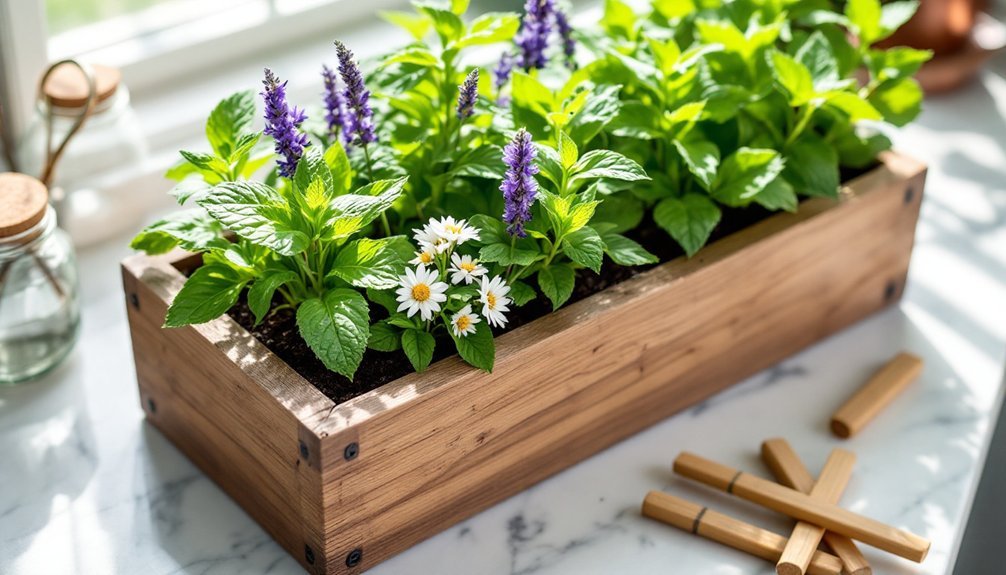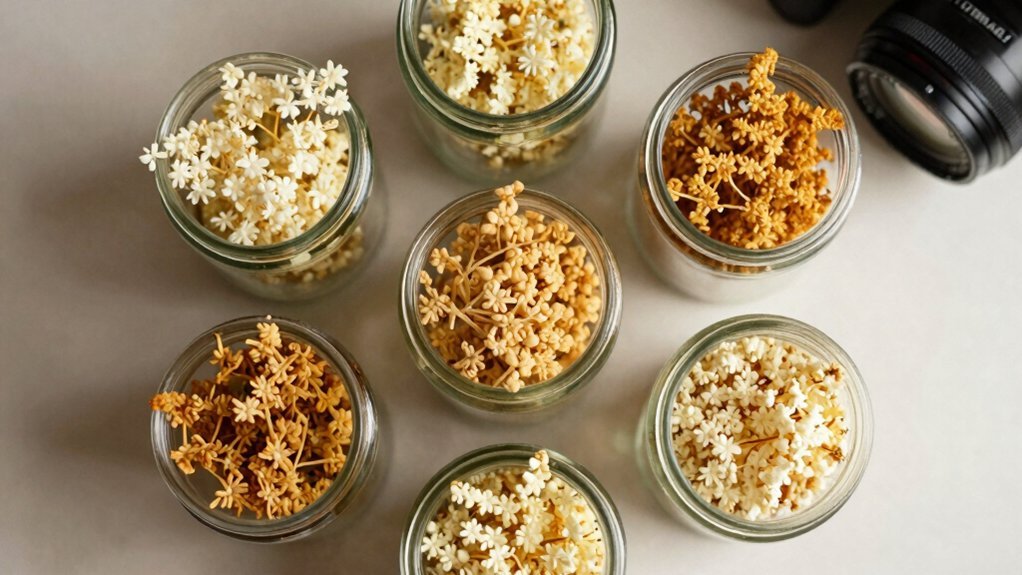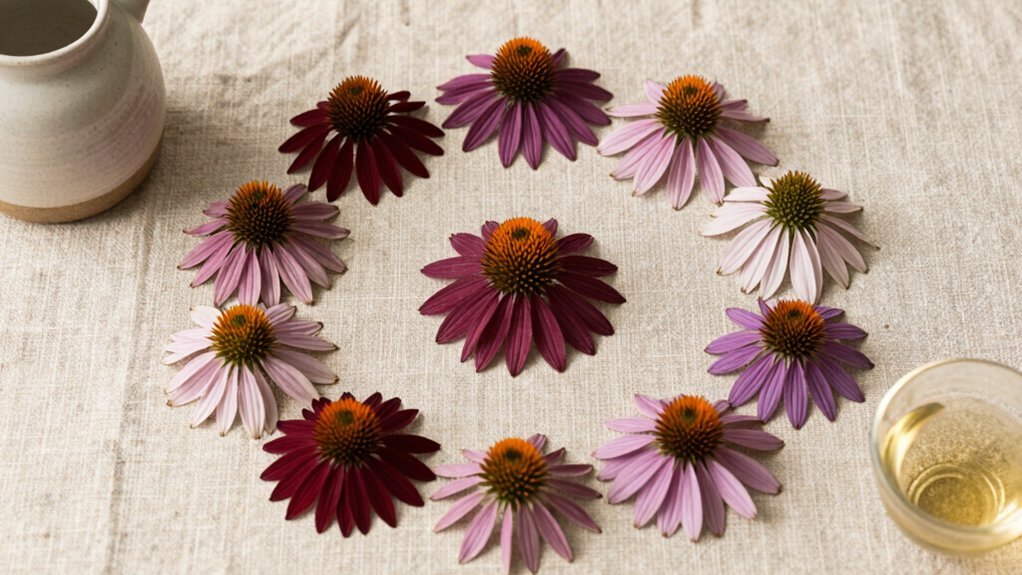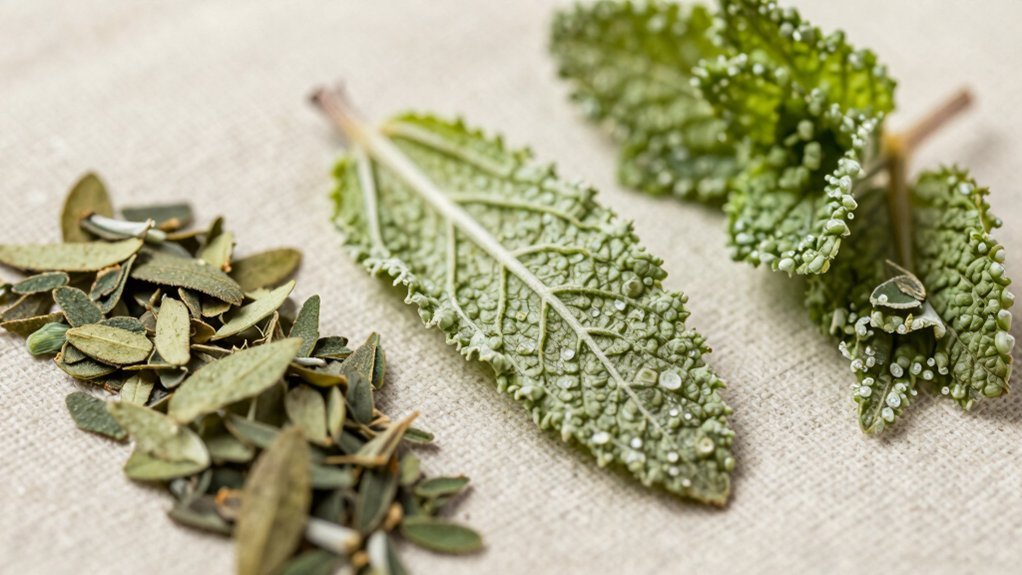If you've ever dreamed of crafting your own herbal teas from fresh ingredients, starting an indoor herb garden might be your perfect next step. You'll discover that growing tea herbs at home isn't just rewarding—it's also surprisingly straightforward with the right starter kit. From calming chamomile to invigorating mint, these five carefully selected garden kits offer everything you need to begin your journey into DIY tea making and access a world of aromatic possibilities.
Indoor Herb Garden Seed Starter Kit for Herbal Tea Growing
Tea enthusiasts seeking a hands-on experience will find the Indoor Herb Garden Seed Starter Kit to be an all-inclusive solution for growing their own herbal blends.
You'll receive four heirloom, non-GMO seed varieties – Mint, Chamomile, Lemon Balm, and Lavender – along with burlap grow bags, soil disks, bamboo markers, and a wooden planter box. The kit's extensive support includes expert guidance through Facebook Messenger and a private grower community.
While some users praise the kit's quality materials and packaging, others report challenges with germination and mold. Though marketed as beginner-friendly, you'll want to reflect on these mixed reviews before choosing this USA-sourced kit for yourself or as a gift.
Best For: Tea enthusiasts and gardening beginners who want to grow their own organic herbal tea ingredients while having access to expert guidance and support.
Pros:
- Complete starter kit with high-quality materials including heirloom non-GMO seeds, grow bags, and wooden planter box
- Comprehensive support system with expert guidance, instructional videos, and active growing community
- USA-sourced seeds from a veteran and family-owned business focused on sustainability
Cons:
- Mixed reviews regarding seed germination success rates and potential mold issues
- Some customers report slow response times for replacement requests
- Higher maintenance requirements than expected for a beginner-marketed product
Herb Garden Starter Kit with Medicinal & Tea Seeds
Green-thumbed beginners will appreciate this extensive USA-made starter kit that includes everything needed to grow fresh medicinal and tea herbs at home. You'll get three packs of heirloom, non-GMO seeds for basil, cilantro, and parsley, along with eight nutrient-rich soil disks that expand in water.
The kit's three metal pots feature strategic drainage holes and come with a protective tray to prevent water damage. Whether you're growing herbs on your windowsill, balcony, or kitchen counter, you can harvest year-round. While some users report mixed germination success, the kit's thorough growing guide helps you cultivate a bountiful crop.
Best For: Beginning gardeners and herb enthusiasts looking for a complete, user-friendly kit to start growing their own fresh herbs indoors or outdoors.
Pros:
- Complete all-in-one kit with quality components including metal pots, soil disks, and non-GMO seeds
- Versatile growing options for both indoor and outdoor settings with year-round harvest potential
- Made in the USA with durable materials and well-designed drainage system to prevent overwatering
Cons:
- Inconsistent germination success rates reported by some users
- Limited to only three herb varieties (basil, cilantro, and parsley)
- Basic plant markers and minimal care instructions could be more detailed for beginners
Tea Seeds Indoor Herb Garden Kit for Herbal Tea Making
Aspiring herbalists and tea enthusiasts will find their perfect match in the Savvy Spade Herbal Tea Garden Kit. You'll receive high-quality, non-GMO heirloom seeds including chamomile, lavender, mint, and lemon balm, all sourced from trusted U.S. growers.
The kit's environmental impact is remarkable – you'll reduce your carbon footprint considerably compared to store-bought teabags. Everything you need comes in a charming burlap bag, from soil amendments to plant markers and a reusable tea infuser. Even gardening novices report success with this kit, though you'll want to monitor watering and guarantee proper lighting for peak growth.
Best For: Tea lovers and indoor gardening enthusiasts who want to grow their own organic herbal teas while reducing their environmental impact.
Pros:
- Complete kit with high-quality, non-GMO heirloom seeds from reputable U.S. growers
- Environmentally friendly alternative to store-bought tea bags with reusable components
- Attractive packaging makes it an ideal gift, coming in a charming burlap bag with all necessary supplies
Cons:
- Requires careful attention to watering to prevent mold growth
- Needs adequate lighting conditions for optimal plant growth
- May take several weeks before plants are mature enough for tea making
Herb Grow Kit with 10 Seeds DIY Garden Starter Set
Beginners looking to start their own tea garden will find everything they need in this extensive 10-seed DIY starter kit. You'll receive seeds for tea-friendly herbs like chamomile, lavender, and sage, along with essential supplies including pots, markers, soil discs, and pruning tools.
While the coconut coir soil discs expand considerably when hydrated, you might need additional soil for ideal results. Germination takes 2-8 weeks, and you'll need to guarantee proper temperature, water, and light conditions. Some users report mixed success with seed sprouting, but the manufacturer's responsive customer service addresses concerns with refunds or replacements.
Best For: Beginner gardeners and tea enthusiasts looking to start an indoor herb garden with a comprehensive, user-friendly kit that includes everything needed to get started.
Pros:
- Complete starter kit with 10 different herb varieties and all necessary growing supplies
- Expandable coconut coir soil discs promote healthy seed germination
- Responsive customer service offering refunds or replacements if issues arise
Cons:
- Included soil quantity may be insufficient for all pots
- Inconsistent germination success rates reported by users
- Some customers reported missing seeds or components in their kits
Indoor Herb Garden Starter Kit with 5 Herb Seeds and Planting Set
Tea enthusiasts looking for a complete growing experience will find everything they need in this all-encompassing Indoor Herb Garden Starter Kit. You'll receive five types of non-GMO herb seeds, including mint, which is perfect for tea making. The kit includes jute bags, plant markers, coconut coir soil disks, mini shears, and a detailed planting guide.
The soil disks expand to ten times their size when soaked, giving your herbs plenty of room to grow. While the jute bags aren't waterproof, they're attractive and sustainable. Keep in mind that germination takes 2-8 weeks, and you'll need to place your herbs in a sunny spot once leaves appear. Consider adding a waterproof tray to protect your surfaces.
Best For: Tea lovers and herb gardening beginners who want to grow their own fresh mint and other herbs indoors with a complete starter kit that includes everything needed to get started.
Pros:
- Complete all-in-one kit with seeds, soil, containers, and tools for immediate start
- Eco-friendly materials including non-GMO seeds and biodegradable jute bags
- Educational and engaging project suitable for both adults and children
Cons:
- Jute bags aren't waterproof and require a separate tray for water collection
- Mixed success rates with seed germination reported by customers
- Long waiting period of 2-8 weeks for herbs to grow to usable size
Factors to Consider When Choosing an Herb Garden Starter Kit for Tea Herbs for DIY Tea Making
When you're selecting an herb garden starter kit for tea making, you'll want to check the seed quality and verify they come from reputable sources that offer high germination rates. Your available growing space, whether it's a sunny windowsill or small balcony, will determine the appropriate container size and number of plants you can successfully cultivate. The kit should include essential growing materials like quality potting soil, proper drainage containers, and detailed instructions while offering a diverse selection of tea-friendly herbs such as chamomile, mint, and lemon balm.
Seed Quality and Source
The foundation of a successful herb tea garden lies in selecting high-quality, reliable seeds. You'll want to focus on heirloom, non-GMO varieties that guarantee both superior plants and sustainable gardening practices. When evaluating starter kits, look for seeds sourced from established USA growers, as these typically offer better germination rates and overall plant health.
Don't overlook the importance of verified germination testing. Kits featuring seeds with proven high germination rates will give you the best chance of success. It's also worth choosing a kit that includes extensive growing guides and support materials to help you maximize your seeds' potential. Remember to check the herb variety selection – a diverse mix won't just provide different tea flavors but can also assure you'll have fresh herbs to harvest throughout the year.
Growing Space Requirements
Growing herbs for tea requires careful consideration of your available space, whether you're working with a sunny windowsill or a compact balcony. When choosing a starter kit, you'll need to verify it's designed specifically for indoor spaces and matches your area's dimensions.
Pay attention to the planter sizes included in your kit, as they'll affect your herbs' growth potential. If you want to grow multiple varieties, look for kits that accommodate several plants simultaneously. Consider stackable or modular systems that make efficient use of vertical space, especially if you're dealing with limited horizontal surfaces.
Don't forget to check the light requirements for your chosen herbs. You'll need to place them where they'll receive adequate natural sunlight, which is essential for healthy growth in confined indoor spaces.
Included Support Materials
Beyond setting up your growing space, successful herb gardening depends heavily on reliable guidance and support materials. You'll want to select a kit that includes thorough growing instructions and instructional videos to guide you through each stage of your tea herb cultivation journey.
Look for kits that offer expert gardening support through help bots or community forums where you can get quick answers to your questions. Plant markers are essential for identifying different herbs, while detailed growing guides should outline specific requirements for light, water, and temperature. The best kits also provide troubleshooting resources to help you tackle common challenges like mold prevention and pest control. These support materials will greatly increase your chances of growing healthy, thriving herbs for your DIY tea blends.
Soil and Container Type
Selecting appropriate soil and containers stands as a fundamental decision when choosing your tea herb garden starter kit. You'll want to look for compressed soil disks that expand when watered, as they're packed with nutrients that boost germination rates for your tea herbs.
Your containers should feature adequate drainage holes to prevent waterlogging and root rot. Consider the size carefully – different herbs need varying amounts of space for proper root development. If you're environmentally conscious, opt for biodegradable options like burlap or jute bags, which add a natural aesthetic to your indoor garden.
The ideal container will strike a balance between moisture retention and drainage. This equilibrium is essential for healthy herb growth and ultimately affects the quality of your homemade teas.
Plant Selection Variety
What herbs will best serve your DIY tea-making journey? You'll want to focus on popular tea herbs like Chamomile, Mint, Lavender, and Lemon Balm, which offer both aromatic qualities and soothing benefits. When selecting your starter kit, prioritize those containing heirloom, non-GMO seeds that can adapt well to indoor growing conditions.
Look for kits that provide a balanced variety of herbs with different therapeutic properties. For instance, you'll benefit from Peppermint's digestive support and Chamomile's relaxation effects. Since you're likely starting out, choose kits featuring easy-to-grow varieties that'll boost your confidence as a beginner gardener. Don't forget to check the seeds' germination rates – higher rates mean you'll have more successful plants and, ultimately, more herbs for your tea-making adventures.
Maintenance Time Commitment
Before diving into your herb garden project, understanding the time commitment is essential for long-term success. You'll need to dedicate about 10-15 minutes daily for basic maintenance, including watering and pest monitoring. The initial germination period of 2-8 weeks requires consistent attention to guarantee your tea herbs get a healthy start.
As your plants mature, you'll face additional tasks that become part of your routine. You'll need to check soil moisture several times weekly to prevent mold issues, perform regular pruning to encourage bushy growth, and harvest leaves frequently to maintain plant health. While these activities don't require extensive time blocks, they do demand consistency. Consider whether you can incorporate these maintenance tasks into your daily schedule before starting your tea herb garden.
Environmental Growth Conditions
Beyond daily maintenance tasks, your herb garden's success depends heavily on creating the right growing environment. You'll need to position your herbs where they can receive 6-8 hours of bright, indirect sunlight each day to guarantee robust growth.
Keep your growing space at a steady temperature between 65°F and 75°F, as temperature swings can stress your plants. Your herbs will thrive in well-draining soil that prevents water from pooling while retaining just enough moisture. Monitor humidity levels carefully, maintaining them between 40-60% to create ideal growing conditions. When it comes to watering, let the top inch of soil dry between sessions to prevent overwatering issues like root rot and fungal growth. These environmental factors work together to create perfect conditions for your tea herbs to flourish.
Kit Component Durability
Durability stands as a crucial factor when selecting your herb garden starter kit for tea making. You'll want to focus on kits that feature sturdy planting containers made of metal or high-quality plastic, as these materials can withstand regular watering and handling while providing long-term value.
Look for breathable grow bags or pots that prevent mold growth and support healthy root development. The soil components should include premium materials like coconut coir, which expands properly and delivers essential nutrients for successful germination. Don't overlook the quality of included tools – durable gardening shears and plant markers will enhance your tea herb growing experience. Additionally, you'll benefit from kits that include well-printed, detailed instruction guides that'll help you maintain your herbs throughout their entire growing cycle.
Frequently Asked Questions
How Long Does It Take for Tea Herbs to Grow Before Harvest?
You'll need to wait 4-8 weeks before harvesting most tea herbs. Your chamomile, mint, and lemon balm will be ready sooner, while herbs like sage and lavender take longer to mature fully.
Can Tea Herbs Be Grown Successfully in an Apartment Without Direct Sunlight?
You can grow tea herbs indoors with grow lights as a substitute for natural sunlight. While some herbs like mint and lemon balm are more tolerant of low light, you'll get better results using artificial lighting.
Are These Herb Garden Kits Safe for Households With Curious Pets?
You'll need to be cautious with pets around herb gardens. While many tea herbs are safe, some like chamomile and mint can be toxic. Keep your garden in a secure location pets can't access.
How Many Cups of Tea Can One Harvest Typically Produce?
You'll get 15-20 cups of tea from one mature herb harvest, but it varies by plant type. If you're growing chamomile, mint, or lemon balm, you can expect multiple harvests throughout the growing season.
Do Tea Herbs Need to Be Dried Before Making Tea?
You don't always need to dry tea herbs – you can use them fresh! However, drying helps preserve them longer and often intensifies their flavors. If you're drying herbs, hang them upside down in a dark place.





Leave a Reply